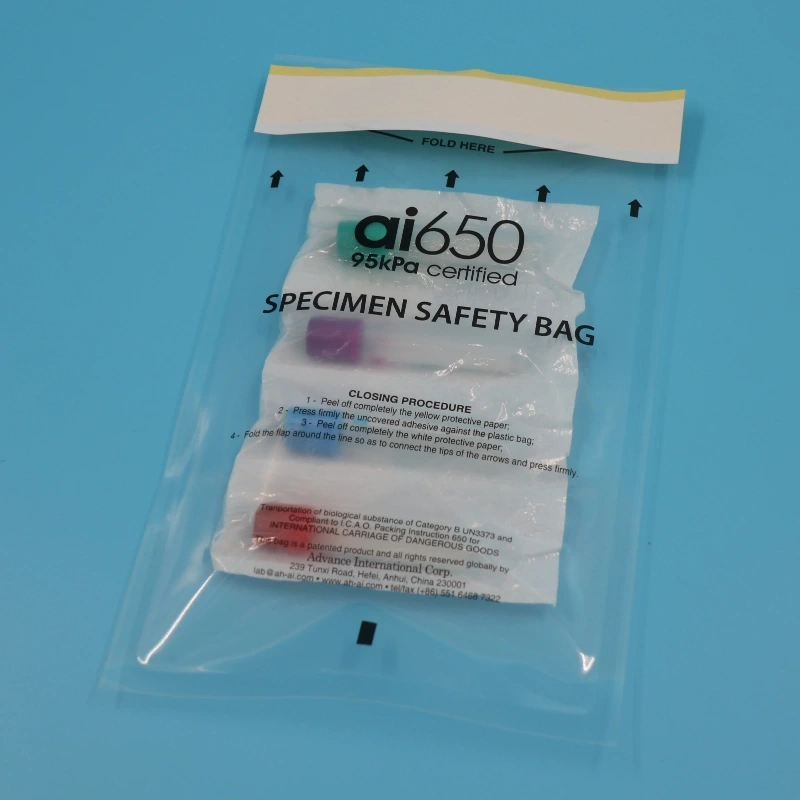UN3373 Compliant 95kPa Bags for Biological Sample Transport
Release time: 2025-09-02
In the realm of medical and laboratory logistics, the safe and compliant transportation of biological samples is paramount. Whether it’s blood, tissue, or swabs for diagnostic testing, ensuring these samples reach their destination securely and without contamination is critical. This is where 95kPa bags, specifically designed as medical sample transport bags, play a vital role in meeting UN3373 Biological Substance, Category B regulations. In this article, we explore the importance of these specialized biological samples shipping containers and highlight recent innovations that are revolutionizing the industry.
What Are 95kPa Bags and Why Are They Essential?
A 95kPa bag is a leak-proof, pressure-resistant transport bag engineered to withstand an internal pressure differential of at least 95 kilopascals (kPa) without leakage, as required by UN3373 regulations for Biological Substance, Category B. These regulations, set by the International Air Transport Association (IATA) and other regulatory bodies, ensure that biological samples, such as blood vials, urine, tissue specimens, or swabs (including those for COVID-19 testing), are transported safely by air, road, or sea.
The 95kPa bag serves as a secondary packaging layer in a triple packaging system, which includes:
- A leak-proof primary receptacle (e.g., a blood vial or specimen container).
- A secondary packaging, such as the 95kPa bag, often equipped with absorbent materials to contain any leaks.
- A rigid outer packaging, like a box, labeled with the UN3373 diamond-shaped mark and the text “BIOLOGICAL SUBSTANCE, CATEGORY B.”
This robust system ensures that samples remain uncontaminated, handlers are protected, and regulatory compliance is maintained during transit, even under challenging conditions like high-altitude air travel where pressure changes can cause leaks or ruptures.
Key Features of Modern 95kPa Bags
Recent advancements in UN3373 sample bags have significantly improved their functionality, user-friendliness, and environmental impact. Here are some standout features of modern 95kPa bags:
- Pressure Resistance: Certified to withstand 95kPa pressure, these bags are rigorously tested to ensure no leakage occurs, even during air transport. For instance, products like the AIC™ 95kPa bag are independently certified by ISO 17025 accredited laboratories, providing confidence in their reliability
- Absorbent Integration: Many 95kPa bags, such as the AIC™, incorporate built-in absorbent pads or sleeves capable of absorbing the entire contents of the primary receptacle, reducing the need for additional materials and simplifying packing
- Tamper-Evident Seals: To ensure sample integrity and chain of custody, modern bags feature tamper-evident seals. For example, AIC™ 95kPa bags include a unique closure system and sequentially numbered seals for added security
- Ease of Use: Innovations like easy-open tear perforations and simple closure systems make these bags user-friendly for both senders and recipients. The Biobag-1 95kPa Specimen Transport Bag features a see-through design for easy identification of contents
- Eco-Friendly Options: Companies like AIC™ have introduced recyclable options, such as the AIC™ range, which combines UN3373 compliance with sustainability by offering 100% recyclable materials
- Versatility: These bags are designed to accommodate a wide range of primary containers, including blood vials, specimen containers, swabs, and medical devices, making them suitable for diverse applications in healthcare and research
Applications in Medical and Research Settings
95kPa bags are indispensable in various scenarios, including:
- Clinical Diagnostics: Transporting blood, urine, or tissue samples for medical testing, such as COVID-19 swabs or routine diagnostic specimens
- Research: Safely shipping samples for clinical trials or scientific studies, ensuring they remain viable for analysis.
- Public Health: Supporting rapid and secure transport of samples during outbreaks, as seen with COVID-19 testing
For example, the AI 650™systems by AI 650™ are tailored for shipping a variety of primaries, adhering to IATA, ADR, and DOT regulations, ensuring compliance across local, national, and international shipping lanes
Compliance with UN3373 Regulations
UN3373 regulations, outlined in Packing Instruction P650, specify requirements for Biological Substance, Category B transport.
Key requirements include:
Leak-proof primary and secondary packaging.
The ability of either the primary or secondary packaging to withstand 95kPa pressure without leakage.
Sufficient absorbent material to contain any potential leaks.
A rigid outer packaging with proper labeling, including the UN3373 mark and text
Failure to comply with these regulations can result in health risks, sample contamination, or legal penalties. Using certified 95kPa bags ensures that laboratories, hospitals, and research facilities meet these stringent standards.
Choosing the Right 95kPa Bag
When selecting a 95kPa bag, consider the following:
- Sample Type and Volume: Ensure the bag can accommodate your primary containers and includes sufficient absorbent material (e.g., up to 1L per primary receptacle, with a maximum of 4L per outer packaging)
- Transport Method: Air transport requires strict adherence to IATA regulations, while road transport may allow more flexible outer packaging
- Certifications: Choose bags certified by accredited laboratories to guarantee compliance
- Sustainability: Opt for recyclable options like AI 650™ to reduce environmental impact


